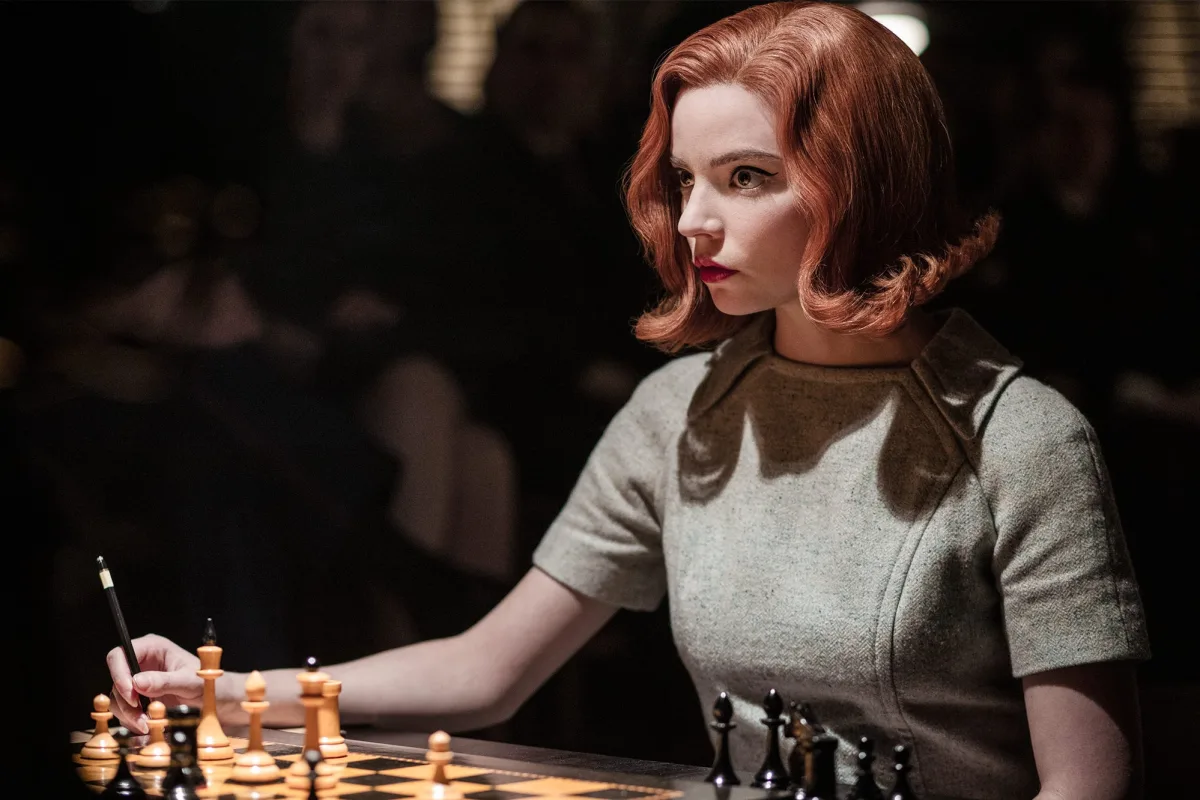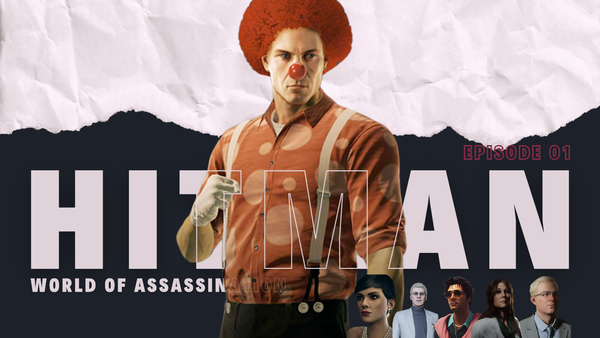The Queen's Gambit (Netflix) | Review

The Queen's Gambit is an American drama television mini-series based on Walter Tevis's novel of the same name, starring Anya Taylor-Joy. It was created by Scott Frank and Allan Scott and premiered internationally on Netflix in October, 2020.
Let's do things differently this time. Let's start with the ending.
What I liked especially about the Moscow chapter is that it puts Beth’s relationships with the men, with the chess players in her life, into perspective. The show is very good at putting almost everything into perspective, through the flashbacks when her mum tells her,
Men will come into your life, and they will think that they can teach you something; and, well, maybe they can, but it doesn’t mean they’re smarter than you. It just makes them feel bigger than you. And they will come and they will go, and you will move on, and you will do whatever the hell you like.
And that’s really… the show is quite good at lampshading these things, so just when first there’s Harry and then there’s Benny, and you start to worry about the show miscasting its own heroine, it then becomes clear that that is the motivator for why Beth lets them in. The thing that her mother told her, that in the end you’re your own master. What it really means, however, is that Beth still needs a support system. Those flashbacks explain her motivations, but they also lay the groundwork for her realisation that what her mother taught her isn't sustainable. Not because these other people are men, but because they're her friends. (Plus, with Beth being bisexual, that burden of proof, that male-female dynamic is displaced, anyhow. Men were just around more; relationships are what's difficult for Beth. Another facet that her mother couldn't have predicted.)
They’re trying to pull the same trick with Jolene, but it doesn’t actually work: because it’s quite hamfisted, because Beth never looked her up, and because they foisted on Jolene a responsibility that shouldn’t have gone to a Black woman in that moment. Because it just throws her squarely into the Mammy trope and calls it done. Suddenly, she reappears to essentially save Beth, but they attempt to subvert it, unsuccessfully, when Beth tells her she's her guardian angel and Jolene denies it — ostensibly subverting the trope, but not really — and says, “We’re family.” Okay, but...
Based on what? Beth has given her nothing, meanwhile Jolene has followed her career, and she’s now willing to give her 3.000 Dollars, no questions asked. I mean, excuse me? Of course the narrative conceit is that she has such faith in Beth winning that it’s all fine and dandy, but 3.000$ was a very different kind of money then. And all that aside, even if it weren’t, calling on the one Black character, the lone Black woman on top of that, to save Beth from herself (not for the first time) and then give her the money she needs to fulfil her dream that Jolene objectively has no stake in? Oy.

Beth never even paid Shaibel back! Think about that for a minute! And yet they all unconditionally love her.
The irony is that I looked it up, since the series is based on a book, and in the novel, Beth goes looking for Jolene first. So I have to wonder about that choice that they made — why did they think that neglecting Jolene and then having her come in at the eleventh hour to put everything right, comfort and coddle Beth and give her that money (that Beth could have gotten from elsewhere, but refused to clench her teeth), was the more dramatic/better play? Like this, it felt very much like they knew they had to use her again so as not to make everyone livid, but they picked the literally last possible moment to bring her in. And no, having her say, “Good on you, cracker,” isn’t a ringing endorsement of this writers room’s sensibilities.

There's an interview with Moses Ingram, who plays Jolene, in Screenrant, and the questions are... very white. They're couched in "Oh, Jolene wasn't as involved with the chess" rhetoric, swerving around the fact that she wasn't involved at all.
That's not to take away from Jolene's position in her firm, or the joy of her natural hairstyle. But those are easy set dressings for a script that uses her rather than giving her agency.
It’s not that I don’t appreciate Beth not letting herself be instrumentalised especially by the pushy Christians, I do. But the show also very much glosses over how she never once goes back to thank Mr Shaibel, or Jolene. She only holds that grudge against Mrs Deardorff.
The people that Beth has relied on — her adoptive mother, who died far too young, and Harry and Benny and the boys — she never gets to build a support system because she pushes people away.

What I like about the Moscow chapter is that the Soviet players are never the enemy. They’re a source of fear for Beth, cause they’re so very good, especially Borgov, but they’re never the enemy. When she’s in Moscow, it all contrasts. The beautiful but brutalist architecture of Soviet Russia contrasts with the warmth that she is treated with, especially by the other players. Sure, some may be dismissive of her, but the players that she has the hardest matches against, they value her and they’re very kind. That also plays into how the story doesn’t let her be instrumentalised by other people, not by the Christians, not by her State Department minder. She doesn’t let that happen. It could be easy to make the other players evil Russians, but they’re not. Borgov is especially kind, actually. He doesn’t show emotion, at all. The only time he shows emotion is either when he’s talking about Beth, or when he plays against her. He is for the first time concerned when Beth cries when she realises that he won in Paris. He’s worried and he’s surprised, I think. I’m not sure whether he’s surprised that she would cry, or whether it drives home how much she is like him, because she has to win because she has no other choice. I mean, for him, it’s about the regime putting pressure on athletes and them being coopted as part of the propaganda machine. Once they are a part of that, there's no getting out. And you know, he just loves chess. And he may even have a pathetic love of country, but he’s not a politician. The fact that Beth has someone with her who tells her to watch for signals even suggests that he’s looking to defect, who knows. But the show doesn’t turn political thriller.
Borgov has no choice, and he has to also stay on top of his game to be valuable. But for Beth, certainly there are pressures behind her, which she’s mostly resisted. For her, it’s about winning, it’s about trauma, it’s about purpose. And I think in that moment he realises that, and recognises that, for her, it’s not just about competitiveness, it’s just about ambition. I think in that moment he realises that it goes deeper for her. And when they play in Moscow, first he offers her a draw, which already speaks to the respect her has for her because he is death in the endgame, but to offer a draw means he doesn’t know whether he’ll make it out of this one the winner.Shestill manages to think her way out of it. And he doesn’t show it, which is excellent and very restrained acting, but I fully believe that he’s very, very proud of her in that moment. He’s honoured to have been beaten by her. So the show doesn’t let itself be roped into portraying the evil commies.

The other thing that I liked was that it all culminates in Beth finding a support system. Because it puts her relationships with Mr Shaibel, too, and with Harry and with Benny, with Townes, it all puts it into perspective. She’s a woman breaking into a male-dominated field. In Russia at that point, the women’s chess is far more established, but the women have never played against the men. And because Beth came up in the US where there was was no dedicated women’s chess, they didn’t have much of a choice. It doesn’t mean that the American system was miraculously more progressive or anything. And I think it’s very telling, for one thing. It seems that with pretty much every halfway interesting man whom she plays against and whom she encounters, there is automatically sexual tension. Because stupid men can never resist a woman who challenges them.
And they don't know what to do with her except sexualise her — during that interview at the house, the photographer basically directs her to hold up her trophies level with her breasts.
It’s easy to fall in love with Beth — for Cleo, too. Even Townes was confused for a minute there. Beth herself is bisexual; and I’m glad it isn’t tied to the cause of her destruction in Paris. She says to Benny it didn’t matter whether she was hungover, she would have lost anyway, and it wasn’t Cleo’s fault or her own for going down to the bar and then sleeping with her.
But basically what that final episode does is it puts her relationships with these men, especially when they’ve also turned sexual, into perspective because it’s not that she’s had a bunch of teachers. Mr Shaibel taught her the game itself, but her relationships with Harry and Benny in particular
When there’s that flashback to her mother telling her they’ll be in her life but they’ll move on: that’s obviously the main motivator for Beth letting them in, but also for eventually and almost inevitably pushing them away, inadvertently or intentionally. Eventually it comes about that it’s not that she had a bunch of teachers who wanted to feel bigger than her, it’s that she had the chance to make genuine friends, and blew it.

What the Soviets do, what the Russian players do, is that they work together. It’s what eventually makes the Americans lose. Borgov may be the best player out of all of them, but he still uses the intelligence of the others to make his own game better. When you prepare as a team, you are better. Which is why they say, when you play one Russian, you play all of them at the same time. What gets Beth through that midgame is that she workshopped it with the others. They all got together and said, We want to help our friend. It’s how she gets that far. And then when Borgov stops doing what he’s supposed to be doing, and she’s on her own, it emerges that she is even better than him because she thinks and visualises outside of it. She’s been stone cold sober, but she unlocks that space in her head where she can visualises the board on the ceiling. The tranquillisers were just a way of getting there. It shows her that, with a support system, she is a better chess player with their help.
The night before the final, you see Borgov sitting down with the others who have already played against her, to review her style and the way she plays; while Beth is on her own. And that’s what makes the phone call so joyous, when she’s with Townes and Benny calls and the boys are there. And that’s the point.

What I like about this show is that they focus on that, support systems and Beth’s way of forming and then falling out of relationships because of how things happened with her mother.
I absolutely adored her relationship with her adoptive mom. Her biological mom was obviously very troubled, and I feel for her, and I can’t begin to imagine what the world did to her for having a relationship with a married man, having her child out of wedlock. Just… the scene with her burning her PhD thesis hurts. Because the right to be able to go to universities and get those degree has been fought for so long and has been so hard-won (and we must acknowledge that with Jolene comes the reminder that for women of colour that process has been longer and harder than for white women). And so, for academia to destroy her is a tragedy, and not an isolated incident. I believe that society painted her as mentally ill, but in the end she was academically and economically and emotionally desperate. That’s a very different thing. Beth definitely got her brilliance from her.
What I love about Alma is that, when Beth calls and says I’m with some friends from my Russian course, and her mother parses that for a second and what that actually means is, “Did you say you’re partying with college students?” — “Yup.” I think her adoptive mom is always conscious of not being the real mom and also wary of having that thrown at her by an angry teenager. But with Beth being a prodigy and growing up so fast, Alma is both torn between encouraging her and reminding her that there is more to life, and that that can mean making bad decisions, with Alma there to pick her up if it fails. You know, “I won’t get pregnant.” — “Famous last words.” Also because it signifies a freedom that she never had.

And comedically, those roles are reversed when Alma confesses about her pen pal and Beth asks her, “Is this why you wanted to come to Mexico City earlier?” That same quality of finding someone out about they’re being a boy. There’s no judgement there at first (that comes later, cause Manuel seems a little bit of a sleaze bag), she’s amused if anything. Bemused, later. Utterly alone and broken when she finds Alma dead in their hotel room. But the entire time, their relationship once they break that ice is based in, “Together, we’ll figure it out.” And I’m so sad that Alma didn’t get to see her win in Moscow.
There has been much delighted yelling about the set design and the production value. Just… the sheer power of the wallpaper.
The final thing I should mention is Beth being a prodigy and a young woman and a great protagonist, but also being a fuck-up in ways that we’ve not been letting female protagonist get away with. That much pain and that much anger, it can be a fast track to addiction, and I like how Beth acknowledges that it isn’t about getting sober once, it’s about getting sober over and over. For a woman, to let an addiction and self-destruction be a part of her character. Especially in a sport as solitary as chess, and especially in the lonely way that American chess players play it due to that spectre of individualism, your own mind can be your own worst enemy. That really ties into Beth’s tendency to self-sabotage — in her relationships more than in her play, for sure, but it’s still present there as well. For her, it also comes as acting out, against herself and against her past. With self-destructive behaviour, of course other people also get hurt, enormously. But the main target of that is Beth herself. She hurts herself. And it manifests in her complicated relationship with alcohol and drugs, because she thought she could only attain that visualisation of the board by being under the influence. The one thing dragging this down is that, visually, the camera objectifies her pain: the beautiful girl with smeared mascara, languishing in her nightgown or underwear.
I think if Beth can keep a couple of those friends around, then she’ll be just fine. And her being mobbed by Russian grandpas so happy to meet her is a lovely place to end it on.
It’s a great moment of honesty when she confesses to Townes that she threw away the pills and then immediately called reception to ask where to get more; because the camera doesn’t show us that. We don’t see that. It hinges on her honesty with herself and Townes for us to know that. We might have thought she’d already turned that corner, but she knows she’s not there yet. And she also knows that it’s easier for her to be sober when she’s around people. It’s why Benny pushes for her to come to him, because he knows that. But she wants to self-destruct. And to circle back to the beginning, it’s a crying shame that the show then relies on mammifying a Black woman to save her.




